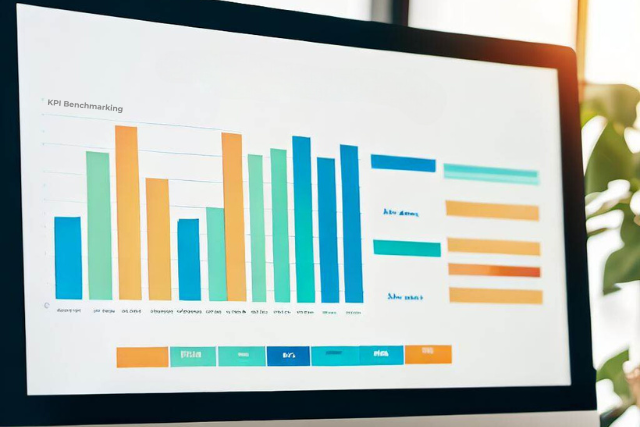What is Competitive Benchmarking?
Competitive benchmarking is a strategic process that involves thorough research and analysis of competitors, industry leaders, and similar market players.
By comparing your company’s performance and practices against your competitors, you gain valuable insights into your market position and identify opportunities for growth and improvement.
Competitive benchmarking could include studying a range of metrics, including sales, marketing, customer satisfaction, and operational efficiency.
By setting benchmarks against industry leaders, disruptors, and key competitors, you obtain a comprehensive view of your standing within the market landscape.
Benefits of Competitive Benchmarking
- Comprehensive Market Understanding: Competitive benchmarking provides a holistic view of your standing against competitors, facilitating a clear understanding of your market position.
- Strengthed Value Proposition: Analyzing competitors’ strategies empowers you to strengthen the value you deliver to prospects and customers, fostering loyalty.
- Cultivation of Continuous Improvement: Engaging in competitive benchmarking nurtures a culture of continuous improvement, propelling your company to outperform rivals.
- Sales and Marketing Growth: By pinpointing areas for improvement, competitive benchmarking drives marketing and sales growth, amplifying your market presence.
- Market Differentiation: Competitive benchmarking offers insights into how to differentiate yourself in the market, helping you stand out from the competition.
- Targeted Improvement Strategies: Identify areas of strength and weakness to strategically improve performance and accomplish your business objectives.
- Integration of Best Practices: Learn and apply industry best practices through competitive benchmarking, boosting operational efficiency and profitability.
- Competitive Advantage: Gain an advantage by adopting best practices to attract and retain customers, thus increasing sales and overall profitability.
- Informed Decision-making: Gather crucial data for making well-informed decisions across various aspects such as pricing, marketing, product development, and operations.
- Employee Motivation and Satisfaction: Showcase how employees contribute to company success through benchmarking, improving morale, and overall productivity.
Incorporating competitive benchmarking into your strategy ensures staying ahead of the competition, identifying emerging trends, enhancing customer satisfaction, reducing costs, and fostering innovation.
Types of Competitive Benchmarking (Samples)
There are many different types of benchmarking. That’s the great thing. You can benchmark almost anything from a qualitative or quantitative perspective. However, we’ll give you a few samples of competitive benchmarking.
And in the next section, we’ll provide real-world examples of the benefits of competitive benchmarking.

1. KPI Benchmarking
KPI benchmarking involves comparing an organization’s key performance indicators (KPIs) with those of competitors or industry leaders.
Benchmarking Questions:
- How does our organization’s performance measure against competitors or industry leaders?
- What are the specific areas where our competitors excel in terms of KPIs?
- What are the best practices that top-performing organizations employ to achieve outstanding KPIs?
- How can we enhance our performance to match or surpass our competitors?
- What changes are necessary in our processes or strategies to elevate our KPIs?
2. Product Benchmarking
Product benchmarking entails comparing a company’s products or services against competitors to identify strengths and weaknesses.
Benchmarking Questions:
- How do our products’ features, pricing, and user experience compare to our competitors?
- What are the notable strengths and weaknesses of our products relative to competitors?
- Which areas can we enhance to better align our products with customer needs?
- How can we establish unique selling points that set our products apart from the competition?
- What modifications should we make to improve our offerings in our product development process?
3. Cost Benchmarking
Cost benchmarking involves comparing an organization’s costs for goods and services with those of competitors or industry leaders.
Benchmarking Questions:
- How do our costs for goods and services stack up against those of competitors or industry leaders?
- Where can we identify cost reduction opportunities without compromising quality or performance?
- What strategies do top-performing organizations in our industry use to effectively manage costs?
- How can we optimize our procurement strategies to achieve cost savings?
- What operational changes are needed to lower costs without affecting outcomes?
4. Customer Experience Benchmarking
Customer experience benchmarking entails collecting standardized customer experience metrics and comparing them to competitors or industry leaders.
Benchmarking Questions:
- How does our organization’s customer experience compare to that of competitors or industry leaders?
- In which areas can we enhance the customer experience to better meet customer needs?
- What proven practices do top-performing organizations employ to deliver exceptional customer experiences?
- How can we adjust our processes or operations to elevate the customer experience?
- What shifts should be made in our customer service strategies to improve the customer experience?
5. Price Benchmarking
Price benchmarking involves comparing our pricing strategy against our competitors or industry leaders.
Benchmarking Questions:
- How does our pricing strategy compare to that of competitors or industry leaders?
- Which aspects of our pricing offer opportunities for aligning with or surpassing industry standards?
- What pricing-related practices do top-performing organizations in our sector employ for optimal results?
- How can we refine our pricing approach to enhance cost-effectiveness and value?
- What changes are necessary in our engagement with suppliers to drive pricing improvements?
6. Operational Benchmarking
Operational benchmarking entails comparing an organization’s operational processes and performance with those of competitors or industry leaders.
Benchmarking Questions
- How do our operational processes and performance compare to those of competitors or industry leaders?
- Where can we improve operational efficiency to enhance overall performance?
- What are the leading practices employed by top-performing organizations to optimize operations?
- How can we adjust our processes or operations to achieve higher efficiency levels?
- What changes should be implemented in our operational strategies to achieve performance improvements?
7. Brand Benchmarking
Brand benchmarking involves comparing a company’s brand performance with that of competitors to identify strengths and weaknesses.
Benchmarking Questions:
- How does our brand measure up against competitors regarding awareness, perception, and loyalty?
- What are the prominent strengths and weaknesses of our brand compared to competitors?
- In which areas can we enhance our brand messaging or positioning to improve perception?
- How can we establish a unique brand identity that distinguishes us from competitors?
- What changes should be made in our brand strategy to elevate our brand’s performance?
Competitive Benchmarking Examples
Case Study 1: Competitive Pricing Benchmarking
Situation: Our client faced the challenge of adapting to inflation and wanted to know how competitors in their industry were adjusting their prices.
Objective: Our goal was to conduct a price benchmarking study to examine how businesses in this sector catered to local, regional, and national customers while coping with inflation.
Our Approach: Through interviews with customers and competitors, we discovered how companies altered their pricing in the past year due to inflation. We also looked at the kinds of customers they served, various pricing actions taken, and the terms and conditions of their contracts.
Project Team: Our team included experts with a strong background in industries ranging from B2B to B2C, retail/apparel, food, and beverage.
Industry Experts: We consulted with 16 industry experts, including senior managers in supplier management, buyers, directors of business development, and area sales managers.
Results: Our competitive benchmarking findings gave the client comprehensive insight into their competitors’ pricing and contracting strategies. These insights allowed them to fine-tune their pricing strategy, ensuring they remain competitive and adaptable.
Case Study 2: Competitor Benchmarking Digital Marketing & PR
Situation: In a competitive spirits market, our client wanted to understand how its luxury whiskey competitors attracted customers through marketing.
Objective: We conducted a digital marketing benchmarking study to gain insights into global competitors’ marketing strategies, especially the “4Ps” (Product, Price, Place, Promotion) and their area-focused approach.
Our Approach: With inputs from 15 industry experts, we analyzed the marketing and PR strategies of four prominent whiskey brands. We closely examined their global marketing strategies, product launch tactics, and branding techniques. Additionally, we studied their approaches to specific areas to see what was working.
Project Team: Our team included a former Boston Consulting Group Consultant with a marketing and innovation background and an Associate Consultant.
Industry Experts: We collaborated with 15 industry experts, including heads of marketing and innovation, global brand directors, and managers in sales and marketing from leading whiskey brands.
Results: Our findings allowed the client to refine their own marketing and branding strategies, enhancing their positioning as a luxury whiskey brand on a global scale.

How to Benchmark Competitors
1. Develop Your Benchmarking Project Plan
- Define the goals and objectives of your benchmarking project.
- Outline the scope to determine which aspects of your business you’ll benchmark.
- Create a timeline to establish deadlines and milestones.
- Identify the necessary resources, both human and technological.
- Choose appropriate methods for data collection and analysis.
- Select relevant metrics that align with your business goals.
2. Align Key Stakeholders
- Engage all relevant parties, including team members, management, and executives.
- Ensure everyone understands the purpose and benefits of the benchmarking project.
- Secure buy-in from stakeholders to ensure cooperation and support.
3. Identify Key Performance Indicators (KPIs)
- Choose KPIs that are meaningful and directly related to your business performance.
- Ensure your KPIs are suitable for comparison with competitors.
4. Choose Benchmarking External Partners
- Evaluate and select external partners who can assist with primary and secondary research.
- Collaborate with these partners to gather comprehensive benchmarking data.
5. Collect Benchmarking Data
- To collect relevant data, utilize various methods, such as surveys, VOC interviews, and industry reports.
- Ensure the data collected covers all identified KPIs and aspects of comparison.
6. Analyze Benchmarking Data
- Employ statistical tools and techniques to analyze the collected data.
- Identify trends, patterns, and significant differences between your performance and competitors.
7. Develop a Benchmarking Report
- Summarize the findings from your analysis in a comprehensive benchmarking report.
- Present the data, trends, and insights in a clear and actionable format.
- Include recommendations for areas where improvements can be made.
8. Develop a Plan to Optimize or Improve
- Outline a detailed improvement plan based on the benchmarking report’s insights.
- Define specific actions and strategies to enhance your business performance.
9. Implement Benchmarking Insights
- Put your improvement plan into action by making the necessary changes.
- Involve relevant teams and departments to ensure effective implementation.
- Monitor Your Progress
- Regularly track the progress of your implemented changes against the benchmarking goals.
- Adjust your strategies as needed based on real-time feedback and results.
By following these steps, you’ll be equipped to conduct a comprehensive competitive benchmarking project that informs your decision-making and helps you achieve improved business performance.
Wrapping Up: Benefits of Competitive Benchmarking
The benefits of competitive benchmarking are significant. By methodically evaluating your business against the competition, you can uncover insights that lead to data-backed strategies for improvement. Recognizing the value in learning from competitors is a cornerstone of sustainable business growth.
If you need support for your next competitive benchmarking project, feel free to contact us. We’ll be happy to discuss your needs. Click the contact us button below.
